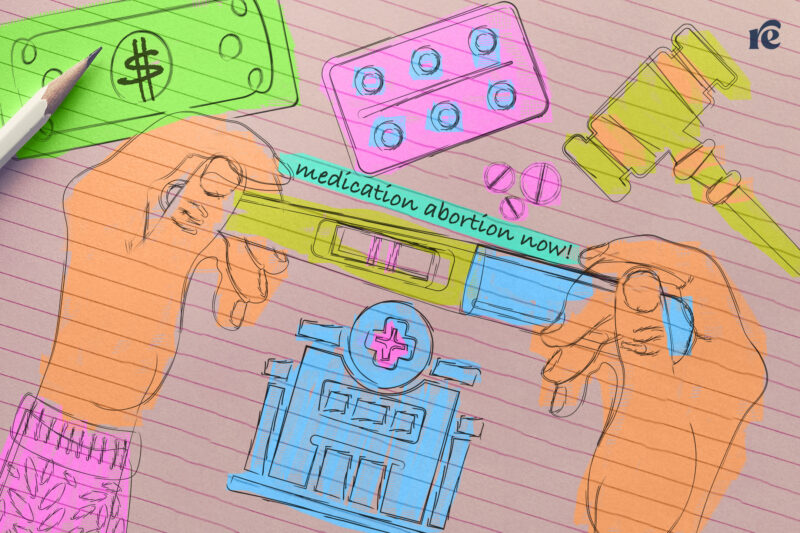Medication Abortion Belongs on College Campuses. Schools Need to Step Up.
There is a higher demand for medication abortion services on college campuses than universities acknowledge.

This story is part of our monthly series, Campus Dispatch. Read the rest of the stories in the series here.
Since my graduation from George Washington University last May, a campus movement has gained steam: a student-driven campaign demanding the university administration provide medication abortion access on campus. The students have prompted the question: What responsibility do universities bear in providing medication abortion access to their student bodies?
The answer is clear—a significant amount.
Medication abortion typically refers to a two-step regimen of the drugs misoprostol and mifepristone, though sometimes it can be misoprostol alone. It is a safe and effective method of ending pregnancy that accounts for more than half of U.S. abortions. Unprecedented judicial attacks on mifepristone as well as in-clinic care across the country make the issue of access even more urgent; in fact, the Supreme Court will hear a case Tuesday that could upend decades of access.
University health centers are uniquely positioned to reshape the abortion access landscape across the country. Many student health plans cover abortion to some degree, and because people don’t always attend college locally, any student health center would undoubtedly be serving people from states where abortion is severely restricted or banned.
Following the June 2022 Dobbs v. Jackson Women’s Health Organization decision, which functionally overturned Roe v. Wade, states with little to no abortion restrictions have an even greater responsibility to increase abortion access, and that duty extends to university health centers. As an increasing number of people are forced to cross state lines to receive abortion care, access points are overwhelmed, with some having weeklong waitlists. If universities could alleviate the burden on clinics by providing abortion pills, more people would be able to access abortion both within a given state or outside of it.
Universities, we are looking to you to step up and ensure your students have access to the health care they need.
This is not a theoretical idea—over the past year, the campuses of Barnard College, University of California, and California State University have agreed to provide their students with abortion pills. The move has impacted the access landscape in their respective states.
In my role at Reproaction as an educator and grassroots organizer providing information on self-managed abortion, I’ve observed that college students are actively seeking guidance on this protocol. It’s evident that medication abortions are taking place on campuses, even in the absence of university support. While students are independently managing their abortions, universities have the resources to provide them with safety, support, and follow-up care if they need it. This should be an easy way to better support their students.
There is a greater demand for abortion access on college campuses than most university administrations acknowledge. According to the Center for Disease Control and Prevention’s 2019 data, people in their 20s account for more than half of the people getting abortions in the United States. A sizable number of this population is concentrated on college campuses, meaning universities supplying medication abortion would benefit the group most needing this health care.
College students also face unique barriers to accessing abortion care that universities can often overlook. For many students, this is the first time they are navigating the health-care system, and they rely heavily on their universities for guidance. While university health centers offer referrals to abortion clinics, students frequently encounter increased wait times or a risk of heightened stigma at these clinics due to their lack of experience with navigating the health-care system. Students may be ill-equipped to maneuver public transportation in their city and aligning appointment times with class schedules may be challenging, particularly in areas where nearby clinics are closed on the weekends. Moreover, medication abortions often involve two doctor’s appointments, potentially forcing affected students to miss more valuable class time.
The challenge of paying for medication abortion adds another layer of complexity, especially for students enrolled in their school’s health insurance plans. Despite the availability of sliding scale fees, the average cost for a medication abortion at Planned Parenthood, for example, is $580 but it can reach up to $800. For many who are college aged—particularly lower-income students—this price tag is a significant barrier to access.
University health centers offering medication abortion prescriptions presents a unique solution to these challenges. They can ensure students receive consistent care in their community, ease the strain on local clinics, and protect students from anti-abortion disinformation. In the absence of institution-provided resources, students run the risk of ending up in the hands of “crisis pregnancy centers,” or anti-abortion fake clinics, many of which explicitly target college students and collectively spend millions on deceptive ads across numerous platforms to lure abortion seekers. The threat posed by these fake clinics cannot be understated: They prey on unwitting pregnant people seeking reproductive health care who may be unable to distinguish legitimate medical practices from ideologically motivated anti-abortion organizations.
Most university health centers already provide some reproductive health care on campus—but they have the potential to do much more. Prescribing medication abortion without an ultrasound is a safe and accepted practice in many states, and this would not present a significant burden for many universities (financial or otherwise), while the positive impact is clear and supported by data.
As Maddy Niziolek and Stephanie Spector, student activists at George Washington University, told me: Students are frequently isolated from “reliable abortion information, financial resources, and essential health care,” and their universities have the resources to fill that gap. When the number of people traveling out of state for abortion has doubled since the overturn of Roe v. Wade, there simply need to be more points of access. Universities, we are looking to you to step up and ensure your students have access to the health care they need.
